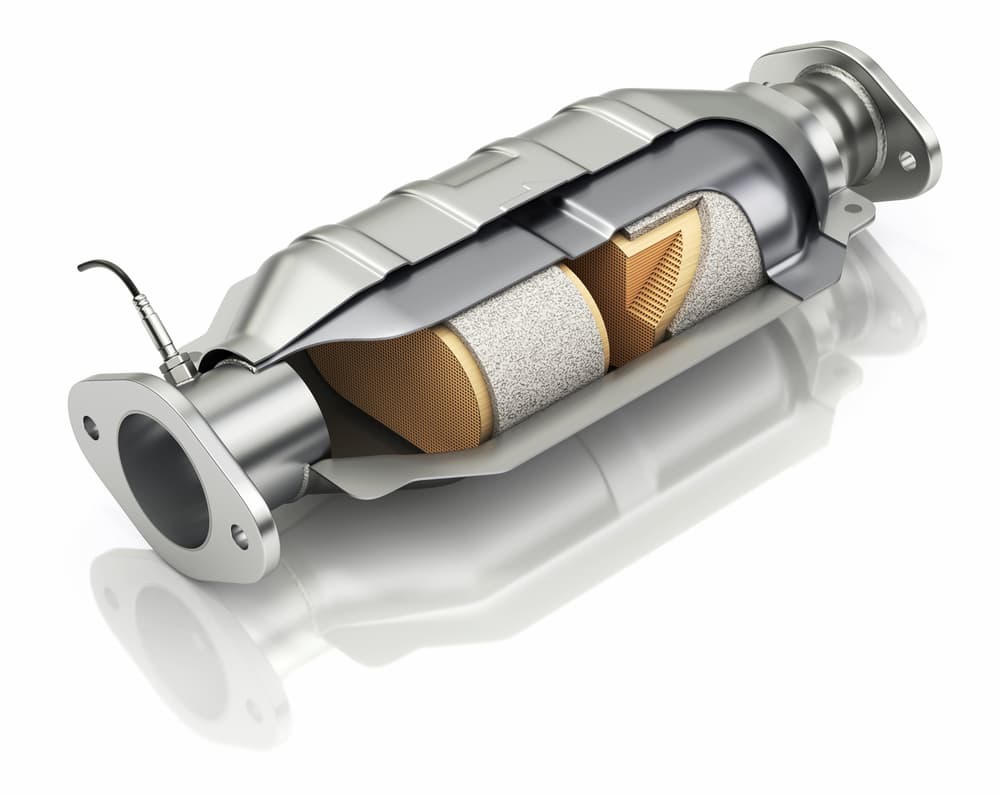Signs of a Bad Catalytic Converter

What Are Common Problems?
As you read about catalytic converter symptoms, you'll learn:
- When you have bad catalytic converter symptoms, ignoring the problem may lead to further damage.
- When you take your vehicle for service at the first signs of a bad catalytic converter, the repairs are much more likely to be quick and easy.
- Preventative maintenance can prevent many catalytic converter problems or at least minimize the damage.
Bad Catalytic Converter Symptoms
The catalytic converter, sometimes shortened to just cat, lives in your vehicle’s exhaust system, between the engine and the muffler, making it one of the last lines of defense against air pollution. As exhaust flows through the catalytic converter, it encounters the catalysts, which are various precious metals and ceramic beads. From which the entire part gets its name, these catalysts help convert pollutants like nitrogen oxide and unburned gas into other gasses that will not be so harmful to the environment.
The good news is that catalytic converters can often last for ten years or more. That means that you may not have to replace the one in your vehicle, and if you do, you'll probably only have to do it once. If you end up replacing the catalytic converter on your vehicle multiple times, that probably means that the vehicle had an especially long life.
If and when the time comes that you do have to replace the catalytic converter, it's helpful to be prepared to recognize the problem as soon as possible. Driving with a failing cat is bad for the environment, can reduce your gas mileage, and might even cause damage to other parts of the exhaust system. That's why it's important to know the following five signs of a bad catalytic converter.
1 – Your Check Engine Light Is On
It's never good when you see that particular light go on, so we always recommend taking your vehicle in for maintenance as soon as possible. It could point to a variety of problems, some of which are extremely serious. Your Phoenix mechanic can run a diagnostic exam of the vehicle to determine if a bad cat is to blame.
2 – Decreased Engine Performance
A clogged catalytic converter prevents the smooth passage of airflow through your exhaust system. The exhaust buildup in your vehicle will likely cause your vehicle to lose some of its performance. This might manifest itself in the form of sluggish acceleration when you press down on the gas pedal. In the worst cases, your car may not even start properly.
3 – Poor Gas Mileage
This bad catalytic converter symptom is tied to the decrease in performance. As your catalytic converter fails and becomes clogged, it will trap exhaust in the vehicle's engine. If your car is getting much worse gas mileage than you're used to, something is definitely going wrong, and it could be the catalytic converter. Chances that your cat is to blame are especially high if the decrease in gas mileage seems very sudden.
4 – Rattling Noises
When your vehicle starts to rattle, it's telling you that something is wrong. When the catalytic converter is rattling, it will get loud as soon as the car starts. This means that the small components inside your catalytic converter have come loose and are tumbling around in there. If you hear a rattling noise and notice some of the other signs of a bad cat, you will most likely know what the problem is.
5 – Unusual Exhaust
Since the catalytic converter is supposed to help eliminate harmful emissions, you might start to notice unusual exhaust once the cat can no longer do its job. If you notice the smell of sulfur (which many people compare to rotten eggs) coming from your exhaust, that's a sign. The same can be said for dark exhaust smoke. If you notice those things, it's almost definitely a bad catalytic converter. If you check under the vehicle, it's likely to feel especially hot, which is yet another sign.
Catalytic Converter Maintenance
As you look at the list of symptoms of the catalytic converter, you might notice that all of these are common signs of serious trouble. Reduced gas mileage and performance are always worth looking into, as are rattling noises and the dreaded check engine light. Whether or not the catalytic converter causes these things, it's a good idea to get car service right away.
If you're lucky, the problem might just be a clogged air or fuel filter that's creating backups in your exhaust system. These problems are relatively easy to fix, and waiting on them will eventually lead to damage to the catalytic converter as well. Replacing the catalytic converter might cost around $1,000. It isn't the most expensive car repair you can be faced with, but a skilled Chevy mechanic will be able to tell you your options.
Catalytic Converter Theft
As mentioned above, the cat contains precious metals in addition to the ceramic beads. Specifically, there are small amounts of platinum, palladium, and rhodium, all of which are valuable. The worth of these metals (and therefore catalytic converters) occasionally attracts thieves, but this is still one of the least common reasons people have to replace the catalytic converter.
Catalytic Converter Service in Phoenix
Valley Chevy dealers can perform maintenance on a variety of different makes and models. We're definitely your local experts for Chevrolet maintenance in the Valley, too. If you're concerned about the catalytic converter in your vehicle, find the location nearest you and come on in for an inspection as soon as possible.
We'll get to the root of the issue and walk you through all of your options to find the best, most affordable solution for your problem. Schedule your service appointment today to get started.
Featured Image: mipan/Shutterstock
